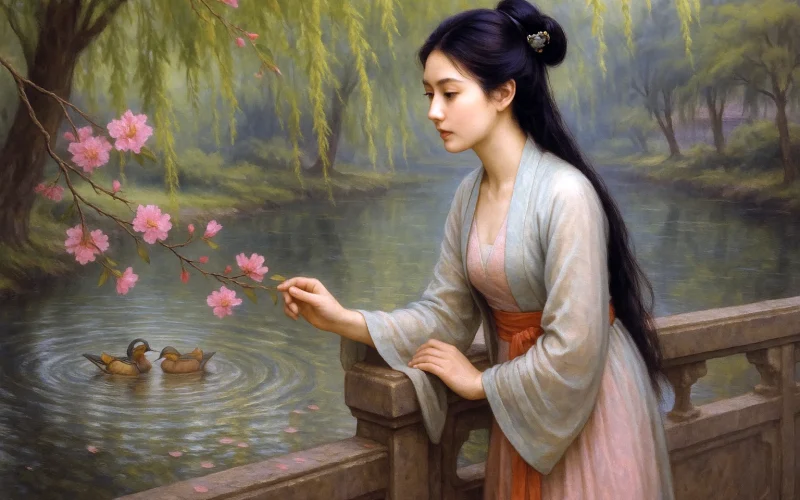Sweet grasses stretch along the endless stream,
Where willows veil the bridge’s towering frame.
Homebound geese fly past,
Wanderers drift like clouds,
By emerald hills they roam.
Soft winds and faint mist veil the drizzling rain,
Across the bank, a horse neighs—whence the cry?
My bowels twist ninefold,
Tears streak both cheeks,
As sunset stains the sky.
Original Poem
「酒泉子 · 芳草长川」
芳草长川,柳映危桥桥下路。
归鸿飞,行人云,碧山边。风微烟澹雨萧然,隔岸马嘶何处。
冯延巳
九回肠,双脸泪,夕阳天。
Interpretation
This ci poem exemplifies Feng Yansi's signature style of expressing profound emotions through delicate scenery. While ostensibly depicting a farewell scene and the inner melancholy of its subject, the work subtly conveys the poet's nuanced observation of separation and his own solitary reflections. With refined language and poignant imagery, the poem demonstrates exceptional artistry in its emotional progression and scenic orchestration.
First Stanza: "芳草长川,柳映危桥桥下路。归鸿飞,行人云,碧山边。"
Fāng cǎo cháng chuān, liǔ yìng wēi qiáo qiáo xià lù. Guī hóng fēi, xíng rén yún, bì shān biān.
Fragrant grasses stretch along endless streams,
Willows mirror the towering bridge where the path disappears beneath.
Homeward geese soar, travelers fade like scattered clouds—
Alone, I gaze toward emerald mountains' depths.
The opening stanza paints a spring farewell scene. "Fragrant grasses" and "endless streams" establish an expansive yet secluded backdrop. The line "willows mirror the towering bridge" shifts perspective vertically, creating layered natural imagery. The dual imagery of migrating geese and departing travelers simultaneously conveys temporal flow and spatial distance, intensifying the poet's solitude. The concluding "emerald mountains' depths" underscores cosmic indifference to human sorrow. Without explicit emotional language, the stanza permeates with unspoken melancholy through meticulous scene-setting, achieving perfect fusion of feeling and scenery.
Second Stanza: "风微烟澹雨萧然,隔岸马嘶何处。九回肠,双脸泪,夕阳天。"
Fēng wēi yān dàn yǔ xiāo rán, gé àn mǎ sī hé chù. Jiǔ huí cháng, shuāng liǎn lèi, xī yáng tiān.
Gentle breeze, faint mist, desolate drizzle—
A horse neighs across the river: Has he returned?
My twisting bowels (nine-fold sorrow), twin cheeks wet,
Under sunset skies.
Transitioning from scene to emotion, the stanza extends the rain imagery into a vast, quiet desolation. The sudden "horse neighs" ruptures the stillness—an external sound triggering internal hope and despair. "Nine-fold sorrow" puns on winding mountain paths and tangled grief, while "twin cheeks wet" externalizes inner anguish against the sunset's glow. The emotional arc moves from stillness to startled hope, then to resigned sorrow, achieving layered profundity without bitterness.
Holistic Appreciation
This poetic work masterfully employs vivid scenic depictions to portray the subtle emotions of a springtime farewell. While the ci contains almost no direct lyrical expressions, it radiates intense emotional hues throughout. The first stanza constructs a multi-layered parting scene through imagery like "fragrant grasses," "long rivers," "precarious bridges," and "returning geese," conveying silent sorrow and reluctance. The second stanza shifts to post-rain landscapes, the neighing of horses, and tear-stained sunset reflections, sketching the loneliness after separation and the grief of shattered hopes, revealing emotional complexity and profound melancholy.
The ci excels in ethereal negative space and circuitous brushstrokes—eschewing direct emotional appeals in favor of gradual psychological unfolding through natural imagery. This embodies Feng Yansi's signature style of subtle depth and emotion-channeling through objects. Particularly striking is the "horse neighing across the river," which propels the emotional climax into fleeting illusion and descent, advancing the emotional rhythm through stillness and motion—the poem's most brilliant stroke.
Artistic Merits
- Emotion Through Scenery, Scenery as Emotion: Without explicitly naming parting sorrows, the ci employs concrete images like "fragrant grasses," "returning geese," "horse neighs," and "sunset" to layer emotions, allowing feelings to permeate like water seeping through.
- Exquisite Details, Rigorous Composition: The first stanza builds a visual space from near to far, low to high; the second moves emotions from stillness to motion and back, forming a closed loop.
- Symmetrical Structure, Unified Imagery: The two stanzas mirror each other in scenery and mood, with a graceful rhythm and natural emotional progression.
- Elegant Language, Profound Meaning: The diction is refined, syntax balanced, expressing poignant farewells with restrained strokes—epitomizing Feng Yansi's lyrical school.
Insights
This ci offers not just aesthetic pleasure but profound insight into the universal human experience of parting. Through calm depictions of scenery and deep captures of mood, the poet evokes a timeless empathy. In modern society, amid shifting relationships and changing fortunes, we can still draw emotional strength from this work: even when alone in storm-lit sunsets, that sincerity, longing, and memory endure like fragrant grasses—everlasting. This is a classic that perfectly blends tender lyricism with philosophical serenity.
About the Poet

Feng Yansi (冯延巳 903 - 960), courtesy name Zhengzhong, was a native of Guangling (modern-day Yangzhou, Jiangsu) and a renowned ci poet of the Southern Tang during the Five Dynasties and Ten Kingdoms period. Rising to the position of Left Vice Director of the Department of State Affairs (Zuo Puye Tongping Zhangshi), he enjoyed the deep trust of Emperor Li Jing. His ci poetry forged a new path beyond the Huajian tradition, directly influencing later masters like Yan Shu and Ouyang Xiu, playing a pivotal role in the transition of ci from "entertainment for musicians" to "literary expression of scholar-officials."












